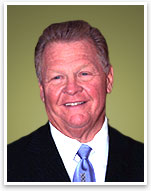 Steve Cody, Managing Partner of Peppercom shared his thoughts about the vital role that having a future-driven vision played in the turnaround and success of his firm.
Steve Cody, Managing Partner of Peppercom shared his thoughts about the vital role that having a future-driven vision played in the turnaround and success of his firm.
Cody had to reinvent his firm after the dot com bubble burst. Not surprisingly with a name like Peppercom, his client base tilted heavily to technology. And when the bust hit, many of his clients evaporated.
According to Steve, “Complacency is a killer. It’s critical to figure out how to differentiate yourself because the marketplace is rapidly changing.
“Agencies that just keep on doing what they’ve been doing for years are heading for trouble. The field of dreams approach does not work. We all have the same kind of relationships with journalists. … The more you are seen as just an order taker and a tactical media relations operation, the more your business will be marginalized.”
Cody has based Peppercom’s differentiation on “understanding what is keeping the client up at night and understanding the changes in the marketplace and the business.”
Cody believes in the value of street level market research. He regularly calls “eight to nine people to find out what they see as their challenges.”
He has developed services and solutions that respond directly to the client concerns he has discovered.
For example, after 9-11, he was told by many clients and business executives that they were reining in their communications budgets. When he probed to determine what areas were moving forward, he discovered that companies were looking for ways to heighten their security and ability to respond to a security-related event. Seeing this, Cody sought out and partnered with a security company to develop a CrisisRx program. Through Crisis RX, the two partner firms provide clients with a realistic simulation of their crisis plans in order for them to preview how they will perform should they have to implement them in real life.
Other product offerings developed in a similar way include
Pain-based Selling: Peppercom partnered with a sales training organization to provide clients with hybrid sales training that draws on the basic principals of effective communications that Peppercom offers in its traditional media training.
Business Outcomes: a measurement program development in partnership with a marketing company.
Cody and Peppercom use the intelligence they have gathered through their research as the driver for an aggressive promotion program for Peppercom.
“We are very aggressive in treating Peppercom as a brand. From the very beginning, we treated Peppercom as a brand. Today, we treat it like a $25K to $30K / month client.”
He constantly mines the data for use in articles and speeches. And he says there is a constant appetite on the part of business people to hear “what is keeping their peer group up at night.”
“All of our senior people are tasked with asking what’s keeping you up at night? What’s keeping your firm up at night? Then we publish the results. Every two months or so, we have thought leadership articles coming out.”
Cody has taken much the same approach to establishing a blog: first research what others have done, test his own approach internally and finally launch it publicly.
Recently, he partnered with PR News for a survey of the C-Suite’s opinion of PR, further differentiating his firm in a hot area.
And now Cody is drawing on this research to create PepperDigital to help executives close the gap between traditional reputation management and marketing and what they are doing online. Another need identified through research.


 I’ll be attending the
I’ll be attending the  Chris is right in his assessment of the important role played in his recruitment by
Chris is right in his assessment of the important role played in his recruitment by 